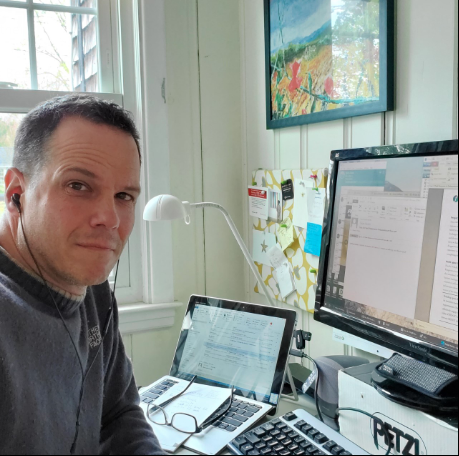Shawn Martin, vice president and office manager of Fuss & O’Neill’s Providence office, said that while working during a pandemic has been challenging on many levels, he has been pleasantly surprised by the unity of people pulling together to work through the difficult times. Martin, who began working for the firm in 2001 as a senior civil engineer, focused on the design of infrastructure, redevelopment and water quality projects, said it may take weeks or months before all of the staff are back working in the office. He said 25 of the Providence office’s 26 employees have been working remotely since March 23. The corporate office for Fuss & O’Neill Inc., which is a full-service consulting firm specializing in engineering, planning, and scientific studies, is located in Manchester, Conn. It’s Providence office is its only office in the Providence metropolitan area.
“I am part of our company’s task force to develop protocols and a phased plan to return to work in all of our offices,” said Martin. “We will follow, or enhance, the governor’s directives, such as reducing occupancy in common spaces, prohibiting the sharing of workspaces and equipment, enhancing daily cleaning of office space and vehicles, installing signage, providing additional cleaning materials, and potentially others.”
“We plan to screen all employees and visitors, require face coverings when social distancing cannot be maintained, continue to provide employees with guidance on safety at work and away from work, and minimize in-person meetings,” he said. “We have been requiring COVID-19 to be included in the mandatory job hazard analysis for all of our projects. Because we have offices throughout New England, our offices will continue to collaborate and share information on how to keep our employees safe and comply with the various executive orders of each state. Lastly, we plan to allow employees to return to the office either when they feel it is safe to do so or when each employee’s individual situation allows. It is our expectation that even when the Governor allows us to return to work, that return will likely not be fully implemented for many weeks, and perhaps months.”
As for his personal thoughts on the pandemic, he said, “Our daily interactions with family and friends has suffered significantly. Digital communication is a great tool but it is not a substitute for the interactions and close contact that we need as humans. We rarely see friends or family these days and miss meals together. For my 50th birthday on May 6, some of my family and a few friends held a caravan down my street in their decorated cars, honking their horns, and wishing me a happy birthday. Our teenaged kids no longer have quality time with their friends or the physical and emotional benefits of team sports. They tend to fill the vacuum with computer and phone time to ward off the boredom and staleness of daily life. I miss working in-person with my colleagues and clients.”
PBN is asking local business owners and leaders five questions in a survey designed to understand how the new coronavirus has affected them and their businesses and what they have learned from the unprecedented challenges. Here are Martin’s responses:
How are you coping amid the COVID-19 crisis?
Like most people, every day is a different challenge. One day we are glad that we can be at home with our families, the next day we are itching to get back to the office. We spend time wondering about what life will be like when things begin to normalize, while trying to deal with immediate needs of payroll, ongoing projects, and making sure our coworkers are safe and healthy. But the one thing that has been the surprising revelation of all of this is how willing everyone has been to roll with it. To do whatever they have to do to help their neighbor, their coworker, their client, and their community. I have never seen a purer example of “we’re all in this together.” We have adapted to working from home and probably talk more now than ever. We have daily calls with our team, zoom happy hours, and have all gotten to know each other’s families more as kids, spouses, and pets have all made guest appearances on video chats. The virus that is keeping us apart physically has brought us closer together emotionally – and I think we will be better as people and as a company because of that.
Have you found silver linings in these difficult times?
Beyond the new ways in which we are connecting with each other, another “silver lining” is that we’ve been forced out of our comfort zones in the way we do business, and that’s pushed us to be more creative. As an engineering firm, most people wouldn’t immediately think of “creative” as being a good descriptor. But it is. Design is inherently creation and working around parameters you can’t change. We have had to figure out new ways to talk with clients, adapt to ever-changing construction schedules, and communicate with the public, which we can’t be around. So we’ve modified and are continuously updating our website (which includes a host of new resources for clients and our communities), we’re reaching out a lot more (which is something we can always do better anyway) via various telecommunications, and we’ve upgraded our IT infrastructure to support it all. We’re also all working non-standard hours to accommodate actual work-life balance – and it’s working! This experience also shows that our prior practice of offering flexible work schedules, which includes working remotely, can be scaled and still support our business objectives while accommodating the needs of our employees’ families and priorities after restrictions ease.
How are you maintaining your company culture?
We are lucky that we had a strong culture before the pandemic. Even though we have offices throughout New England and in California, everyone really knows one another. I know a lot of companies say that but the way we share work and the fact that most of our projects cross disciplines really creates a culture of sharing. And when you walk over to someone’s desk to talk about a project, you can’t help but to get to know them by seeing what they have in their office or cube space or finding common ground as you both decide to get up and get coffee at the same time. Shared experience and true respect were already ingrained in our culture, so we have simply had to maintain that while being physically distant. Video chatting, instant messaging, and picking up the phone ramped up a bit, but our core remains strong. We have implemented a weekly video message from our CEO, weekly interactive fireside chats with regional management, and our intranet has become a fun place for sharing pictures, videos, and personal stories as we all get through this together.
Did your business continuity plan work or were there surprises?
So far, it’s working. One of the biggest surprises is that we had very few technical issues. Most of the issues that we’ve experienced so far have been minor, such as ensuring our employees were provided additional peripheral equipment and were able to take home any of their office equipment and supplies needed to stay productive and comfortable. Our IT department has been investing in our infrastructure and practices to support different ways of doing business, such as working remotely, for years. But, like everything else, we will adapt as needed. We did a significant amount of analysis before selecting and implementing our current plan, but of course it is hard to be certain of anything these days. We believe we have put ourselves in the best possible position for the longevity of our people and our company.
Do you have advice for other local companies?
Be realistic with your goals. Make the tough decisions if they give you a better chance for success. It’s okay to deal with the urgent issues, but don’t forget to implement the actions that are needed to achieve your long-term goals. The important thing is to have a plan and be flexible and to accept that short-term hardship is worth long-term prosperity. Everyone is hurting in myriad ways right now, so that advice might seem a little harsh when things are already difficult. It’s very hard when the decisions you have to make directly impact people you know and care about, and the ultimate outcome is uncertain. But if you’re truly making the best decision you can for the health of your company and its people based on data and consultation with others, which means all stakeholders and not just leadership, then give yourself permission to believe that it will work out for the best in the end.
Cassius Shuman is a PBN staff writer and researcher. He can be reached at shuman@pbn.com.












